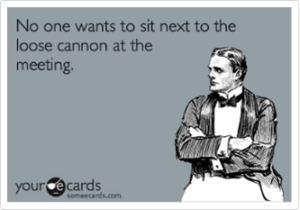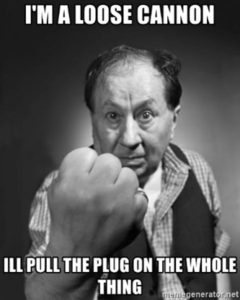Are you reckless with your behavior? Did your friend or boss call you a 'loose cannon?' This post unpacks the meaning and origin of this expression.
Meaning
The expression 'loose cannon' refers to someone exhibiting unpredictable behavior. You can't trust them to behave or follow the rules. It's similar to the term 'wildcard,' meaning you don't know what to expect from the person when you're around them.
If someone is a 'loose cannon,' they could cause harm to other people due to their actions or words. 'Loose cannons' don't listen to other people's instructions, and they prefer to create their own solutions to problems. A loose cannon exhibits vigilante behavior, and they don't care if their actions cause problems for other people.
Example Usage
"John is the loose cannon in the group. He's always acting up in the worst circumstances. You can rely on him to ruin the evening for everyone at some stage."
"Jim is a loose cannon, and I don't know what to do about it. He disrupts the class, and I can't keep him under control."
"Kim is a loose cannon. She refuses to comply with office policy and does her own thing at work. She's going to get us all in trouble with the boss."
"I'm a bit of a loose cannon. I don't like to play within the boundaries of conventional thinking. I like to think outside the box and create new ideas that add value to others' experiences."
"This guy is a loose cannon. I don't know what to expect from him. Every time he's around, I find myself cringing with the expectation that something will go wrong."
"Look, you're a loose cannon, and we have to bring you in. The chief needs to speak to you about your conduct around arresting suspects."
"If you want to be a loose cannon, fine. Don't say I didn't warn you when the boss fires you for acting like an idiot."


Origin
The expression 'loose cannon' originates from the maritime industry in the 1800s. During this period, warships featured cannons along the length of their sides. These cannons were heavy, requiring the crew to mount them to the gundeck using ropes to prevent them from rolling around with the rise and fall of the ocean waves.
If the cannon broke free from its tether, it would roll around the gundeck, probably injuring the crew or damaging the ship. The first use of the expression in its figurative sense comes from The Galveston Daily News, in an article published in an 1899 paper, where it reads as follows.
"The negro vote in the south is a unit now mainly because it is opposed by the combined white vote. It would in no event become, as Mr. Grady once said, 'a loose cannon in a storm-tossed ship.'"
Phrases Similar to Loose Cannon
- Reckless abandonment.
- The wildcard.
Phrases Opposite to Loose Cannon
- Reliable.
- Dependable and discrete.
What is the Correct Saying?
- Loose cannon.
Ways People May Say Loose Cannon Incorrectly
The phrase 'loose cannon' has nothing to do with cannons or weapons. The 'loose' in the expression refers to the unpredictability of a person's nature or actions. The 'cannon' refers to their behavior as reckless, dangerous, or unpredictable.
Acceptable Ways to Phrase Loose Cannon
You can use the expression 'loose cannon' to describe someone acting out of the ordinary. They display unpredictable behavior, and you don't know what they'll do in any given situation. The term suits professional and social use. For instance, you could tell your boss that the new employee is a 'loose cannon' and doesn't comply with company policy surrounding their behavior.
Or, you could tell your friend they're a 'loose cannon' because you never know what to expect when you're with them. A loose cannon describes someone with erratic and unpredictable behavior. You never know if they'll get you in trouble or do something that places you in danger. The phrase suits text-based communications and verbal exchanges.